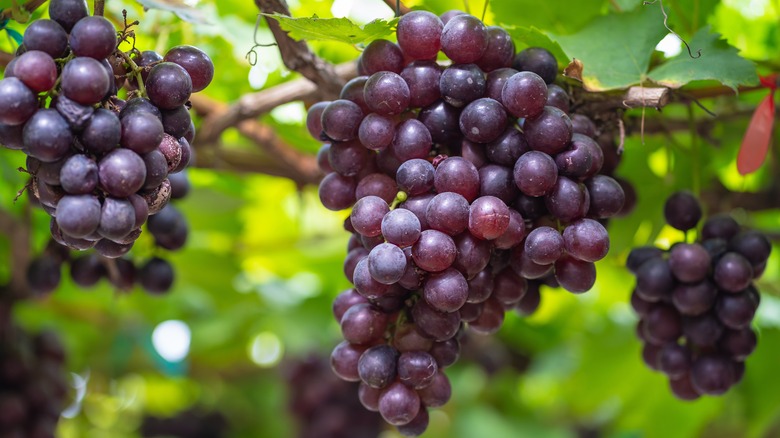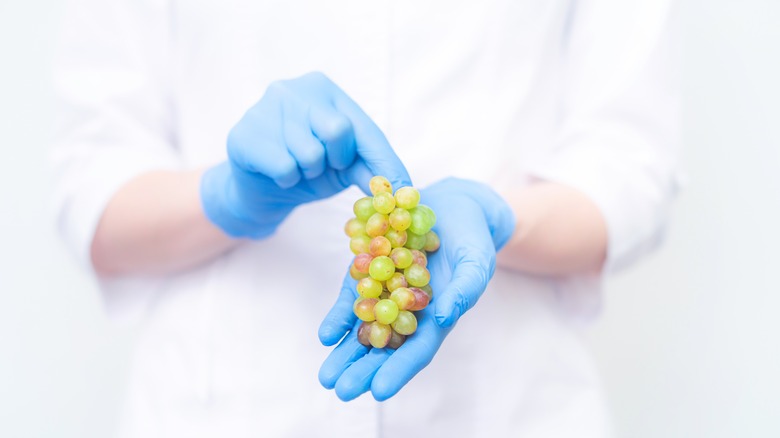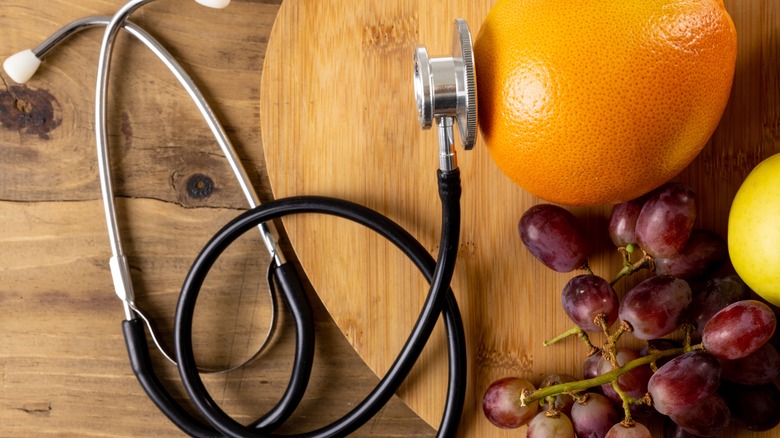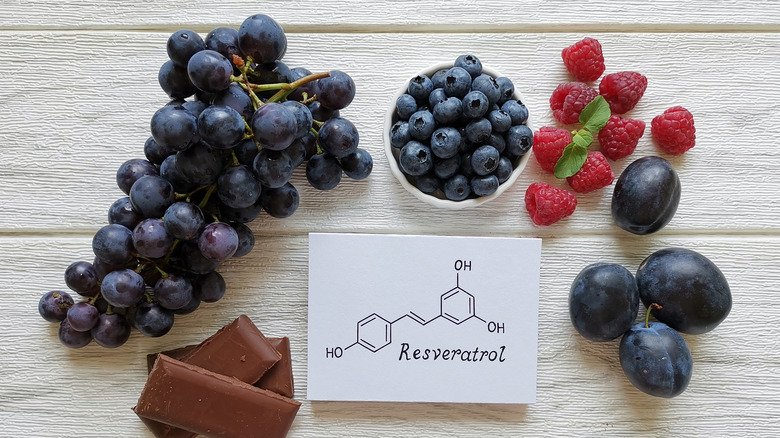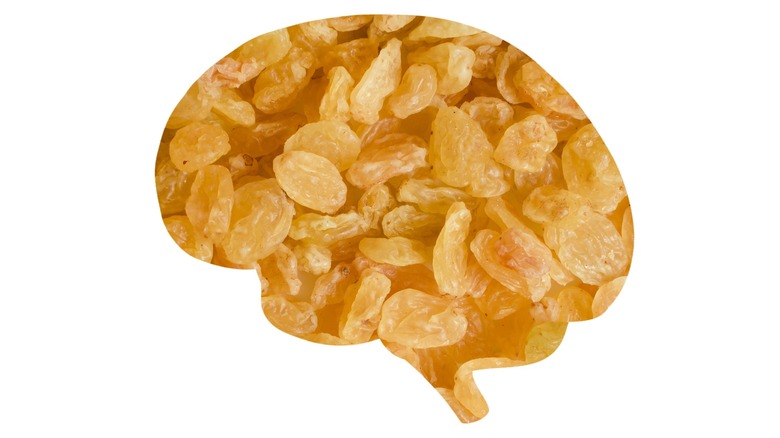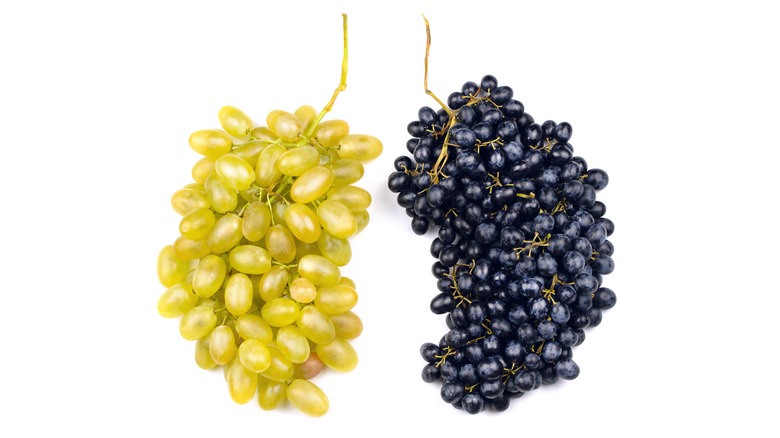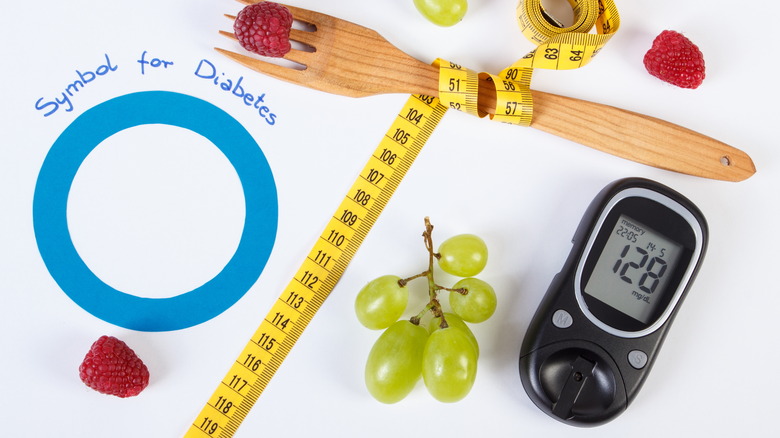What Really Happens When You Eat Grapes Every Day
Imagine eating grapes every day. After clearing the dinner table, you take a little time to yourself with a small platter of cheese and a little bowl of grapes. You settle down in your chair, breathe deeply, and relax your body. Then you reach out and pluck off a grape. Your teeth puncture the thin, translucent skin. Surprisingly sweet, slightly sour juice bursts into your mouth and bathes your tongue. Experiencing this spherical fruit is luxurious and, in addition to the pleasure yielded by its taste and texture, it has some incredible benefits.
For example, grapes could bring you luck if you follow Spanish tradition. According to NPR, people all over the Iberian Peninsula eat grapes at midnight on New Year's Eve to welcome good fortune over the coming year. They must pop 12 grapes into their mouths before the strike of midnight. That might not sound too difficult, but there's a time limit — 24 seconds. A bell chimes 12 times, indicating when each grape goes should be eaten. If that's hard to picture, there are home videos demonstrating the tradition on YouTube.
Of course, good luck could be another way to say good health. Over the past two decades, scientists have uncovered that eating grapes regularly could stave off many serious illnesses and keep people going for longer.
Your immune system gets a boost
The saying should go: "Eat a grape a day and keep the doctor away." Grapes contain plenty of nutrients that contribute to keeping your body healthy. According to the U.S. Department of Agriculture (USDA), this fruit is a source of vitamins A, C, and K, beta-carotene, and potassium. More specifically, though, grapes have qualities that can boost your immune system to fight off infections more effectively.
The National Institute of Health says vitamin C is vital for healing wounds and for the functioning of the immune system. Oranges are a well-known source of vitamin C and that's why some people suggest drinking juice when you have a cold. The jury is still out on whether that works or not, but grapes could be a more soothing option for sore throats. The downside is that you'd have to eat more than 2 pounds of grapes (100 grams of this fruit contains 4 milligrams of vitamin C, per the USDA) to get about the same amount you would from one small glass of orange juice (100 grams of juice has 50 milligrams).
Second, resveratrol in grape skins also has a positive effect on the immune system. A study published in Molecular Nutrition & Food Research indicated that, when combined with a dose of vitamin D, this antioxidant can activate the CAMP gene, which plays a role in the body's first line of defense against bacterial infection.
You protect your heart
Heart disease is a scourge of modern society. The Centers for Disease Control says it caused one in five deaths in 2020 with a total of about 697,000 fatalities in the US. That's a lot, so it's worthwhile to fend off this illness. It turns out that including heart-healthy grapes in your diet is a simple, but effective preventative measure. In the morning, kickstart your day with a grape smoothie or prepare a savory grape salad dressing to top your lunch.
A 2009 study performed by the University of Michigan Health System found that rats with diets that included powdered grapes had lower blood pressure. This was a positive because high blood pressure damages the heart as well as other organs.
Additionally, even when the grape-eating rats had high blood pressure, the grapes protected their hearts. The skins of this purple fruit contain a miracle compound called resveratrol. This substance stimulates heart cells to produce glutathione — an antioxidant that safeguards the body from oxidative stress. High blood pressure lowers the production, but grapes counteracted that for the rats. While medicine was effective at lowering the rats' blood pressure, their hearts still showed more damage than those treated with grape powder.
You can combat tumor growth
Grapes could be a weapon in combating the big C. Cancerous cells grow and reproduce wildly out of control, but there are ways to stop them. According to a 2017 study performed at the University of Texas at Austin and published in Nature, these malignant cells need something called glutamine to expand and thrive. If these cells were leeches, glutamine would be their blood. To kill leeches, block their supply of blood. To kill cancer, block its supply of glutamine.
The researchers discovered that a combination of ursolic acid, which is found in apples, and resveratrol, which is present in grape skins, could block cancer cells in the prostate from absorbing glutamine. With this treatment, the size and weight of tumors in mice decreased.
An experiment published in Science involving mice with bowel cancer showed similar results. Animals that received a small dose of resveratrol as opposed to a large one had much smaller colon tumors. Mice that didn't receive any resveratrol were the worst off. That means people don't need this antioxidant in large quantities to reap its benefits.
Laboratories can artificially produce resveratrol, but, according to research published by The New York Academy of Sciences, eating whole grapes likely provides more benefits than consuming man-made supplements. This is due to the synergetic interaction of several compounds in the fruit.
You can reduce damage caused by strokes
A stroke happens when a blood clot blocks oxygen-rich blood from reaching parts of the brain. According to the CDC, neurons start dying within minutes causing brain damage.
Research published in Neurochem International shows that the effects of a blood clot in the brain don't stop there. The tissue surrounding the primarily affected areas continues to die off during the days following the stroke. This happens because dying neurons release toxic substances that damage neighboring cells.
The scientists conducting the study treated stroke-damaged rats with resveratrol from grapes with fantastic results. They believe it counteracts the secondary effects of strokes in several ways. First, this compound combines with free radicals (those toxic substances released by dying neurons) to prevent oxidative stress. It also reduces inflammation.
Resveratrol is just one type of beneficial polyphenol, or chemical compound, found in grapes according to a review in Nutrition Research (via Science Daily). This fruit also contains phenolic acids, anthocyanins, and flavonoids. These substances play an active role in keeping arteries from hardening, preventing blood clots, and improving circulation, which reduces the likelihood of a stroke or heart attack.
You can preserve your memory
Memory loss is a common ailment in old age. It's particularly scary because having difficulties remembering things makes people feel lost and confused. Nature published a hopeful report about how consuming resveratrol from grape skins in middle age could prevent the onset of this condition.
The hippocampus — a part of the brain — experiences changes as people get older. For example, neurogenesis — the growth of new cells — becomes greatly diminished. This can lead to difficulties in learning and remembering information, but it appears that eating grapes could spark the growth of new neurons in the hippocampus.
In the experiment, scientists separated middle-aged rats — for these rodents that's 21 months old — into two groups. They included resveratrol in the diet of one cohort while the other received none. Then, the researchers taught the rats to swim to a hidden platform over the next few weeks. The resveratrol rats remembered the location and logistics much more quickly than their counterparts. Additionally, scientists found that the genesis of new brain cells increased for this group. That's a great argument for adding a few grapes to your diet.
Your respiratory system can strengthen
Breathe in and let it out slowly. Feel the rush of air flowing to your lungs and filling your chest cavity — it's invigorating. Don't take this sensation for granted, though. According to research performed at Georgia State University, many people live with chronic inflammation in their upper respiratory system, which makes breathing harder. Terms like asthma and chronic obstructive pulmonary disease (COPD) refer to specific conditions caused by inflammation.
One researcher, Dr. Jian-Dong Li, said, "We showed that an important component in red wine and also grapes called resveratrol can suppress inflammation...but how it regulates inflammation still remains largely unknown." The study he conducted showed that resveratrol had a positive impact on respiratory disease as well as middle ear infections, although scientists still don't understand the exact mechanism.
Inflammatory diseases have a huge impact on people — especially children. Asthma is a leading cause of hospitalization for youth under 15 years old and ear infections can lead to conductive hearing loss. Could serving grapes at dinner more often prevent little ones from suffering so frequently?
Your mood can lighten
It's clear from the ancient Greeks' artwork that they knew how to live. In 500 B.C., an unknown artist painted a scene of gods reclining peacefully beneath grape vines. This pottery survived the tests of time and, now, anyone who travels to Etruria, Italy, can see the Athenian Red-Figure Amphora A for themselves. It might be easier, though, to view a photo of it in the Williams College Archives.
The peaceful expressions on the subjects' faces as they lounge under clusters of grapes show pure and utter contentment. Resting, spending time outdoors, and a healthy diet all contribute to mental health, but it's no coincidence that these contented figures appear under Vitis vinifera. In the past decade, scientists have discovered that resveratrol from grape skins could prevent depression.
According to the Federation of American Societies for Experimental Biology, researchers at the University of South Carolina School of Medicine have been taking a look at the connection between inflammation and depression (via Science Daily). They've also been studying how resveratrol reduces inflammation.
Their research began with bullied rats. These rodents showed depressive behavior as well as inflammation in the brain. In the next experiment, the rats took a dose of resveratrol equivalent to that in six glasses of wine. Even after mistreatment by one of their species, the rats who consumed resveratrol showed fewer depressive behaviors and less brain inflammation. Perhaps further research will show this compound is effective in humans too.
You can delay the onset of type 2 diabetes
Grapes are deliciously sweet and have a lot of carbohydrates — 17.2 grams per 100 grams, according to the USDA. Compare that to 100 grams of a soft drink containing 10.6 grams of carbohydrates. Grapes have more sugar than soda, and, yet, surprisingly, several studies suggest that they could delay the onset of diabetes.
The CDC says diabetes is silent and develops slowly, but there are ways to reverse dangerous precursors like insulin resistance. Getting plenty of exercise is the main way to regain insulin sensitivity, but diet also has an impact. For example, Endocrinology published evidence that substances in grapes, like resveratrol, actually lower insulin levels in the body. So, even though this fruit is sugary, the nutrients it contains have an anti-diabetic effect. A survey published in the British Medical Journal showed a significant connection between consuming whole fruits and a lower risk of later becoming diabetic.
Finally, people with metabolic syndrome are at high risk for developing diabetes according to a University of Michigan Health System press release published on Science Daily. Metabolic syndrome describes the combination of high blood sugar, excess fat around the waist, and increased blood pressure. Animal studies proved that although some individuals have a high-fat diet, regular, large servings of grapes reduce the incidence of metabolic syndrome. That likely delays the onset of type 2 diabetes as well.
Resveratrol could help treat female infertility
Grapes help make babies. No, that doesn't mean sensually slipping a grape between your partner's lips as an act of seduction, although that could work too. It means that scientists have discovered that the much-lauded resveratrol found in grape skins could help women suffering from polycystic ovary syndrome (PCOS). These researchers published their findings in The Journal of Clinical Endocrinology & Metabolism.
"Polycystic ovary syndrome (PCOS) is the most common endocrine disorder affecting women of reproductive age," wrote one of the researchers. It is a hormonal imbalance altering the lives of women in their 20s and 30s and the excess of testosterone makes it difficult to become pregnant. Resveratrol mitigates this condition by lowering testosterone.
The women in the study received high doses of resveratrol from injections, not through their diets. It's unclear if eating grapes would have any impact on infertility, but setting out a bunch or two on the table during each meal certainly won't do any harm.
You may sleep more soundly
There is hope for people who lie awake at night trying to bore themselves to sleep by reciting multiplication tables in the dark. The National Health System says ingesting melatonin one to two hours before bedtime helps induce shut-eye. In many places, pharmacies sell melatonin supplements over the counter, but the NHS only recommends them for adults, not children, and with the guidance of a physician. On the other hand, getting a dose of melatonin from natural, whole food doesn't require a visit to the doctor's office. Of course, melatonin isn't hard to find — it's right there in little, purple globes in the produce aisle at the grocery store.
According to research published in Nutrients, grapes are a great source of melatonin. The study states, "The highest melatonin in three kinds of fruits was reported in the range of 8.9–158.9 nanograms/gram...in the skin of grapes." The scientists also found high levels of melatonin in cows' milk. It's no wonder, then, that setting out a cheese platter and bowl of grapes for dessert seems like such a peaceful way to celebrate the evening.
